Raspberries are not only sweet and delicious — they’re packed with antioxidants, fiber, and powerful plant compounds that can improve your heart, gut, and immune health. Studies show that regular raspberry consumption supports weight management, reduces inflammation, and may even protect against chronic diseases like diabetes and cancer. Understanding the science-backed benefits of raspberries helps you make smarter, healthier food choices and get the most out of this vibrant fruit.
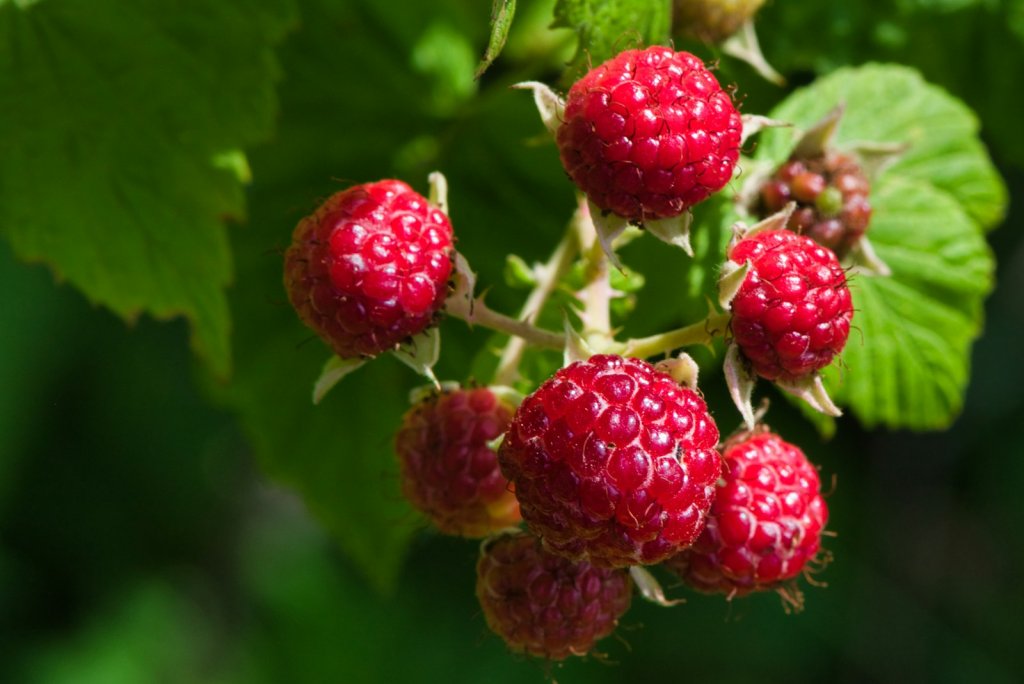
Below, we explore the top health benefits of raspberries, how to eat them safely, and what the latest research reveals.
What Are Raspberries?
Raspberries (Rubus idaeus) are small, edible berries from the rose family (Rosaceae) that grow on perennial shrubs native to Europe and North America. Their bright colour and sweet-tart taste are matched by an exceptional nutritional profile, earning them recognition as one of the most nutrient-dense and antioxidant-rich fruits you can eat.
One cup (about 123 g) of raw raspberries provides roughly:
- Calories: ~64
- Dietary Fiber: 8 g (≈ 32 % Daily Value)
- Vitamin C: 32 mg (≈ 36 % DV)
- Manganese: 0.8 mg (≈ 41 % DV)
- Vitamin K: 9.6 mcg (≈ 8 % DV)
- Folate (Vitamin B9): 25 mcg (≈ 6 % DV)
- Antioxidants: anthocyanins, ellagic acid, quercetin, catechins
(Source: USDA FoodData Central, 2024)
Raspberries are often classified as a functional food—a food that provides benefits beyond basic nutrition—because their high levels of fiber, vitamins, and polyphenols support metabolic, cardiovascular, digestive, and cellular health. According to research from the Harvard T.H. Chan School of Public Health, berries are “among the healthiest foods you can eat … providing potassium, magnesium, vitamins C and K, fiber, and prebiotics” and are strongly associated with reduced risk of age-related conditions. (Harvard Nutrition Source – Vegetables & Fruits)
In addition to the most common red variety, raspberries also come in black, golden and purple types. Though their exact phytonutrient profiles vary slightly, each variety delivers a similar range of health-supporting compounds—making them a smart choice across all colours for long-term well-being.
10 Amazing Health Benefits of Raspberries — Backed by Science
Raspberries are more than just a sweet fruit — they’re a powerhouse of antioxidants, fiber, and essential nutrients that protect your body against oxidative stress, inflammation, and chronic disease. Backed by multiple peer-reviewed studies, these vibrant berries can improve heart, brain, and gut health while promoting overall vitality and longevity.
Below are ten science-supported health benefits of raspberries, with evidence from trusted sources such as PubMed, Harvard T.H. Chan School of Public Health, and the American Institute for Cancer Research (AICR).
1. Rich in Antioxidants and Anti-Inflammatory Compounds
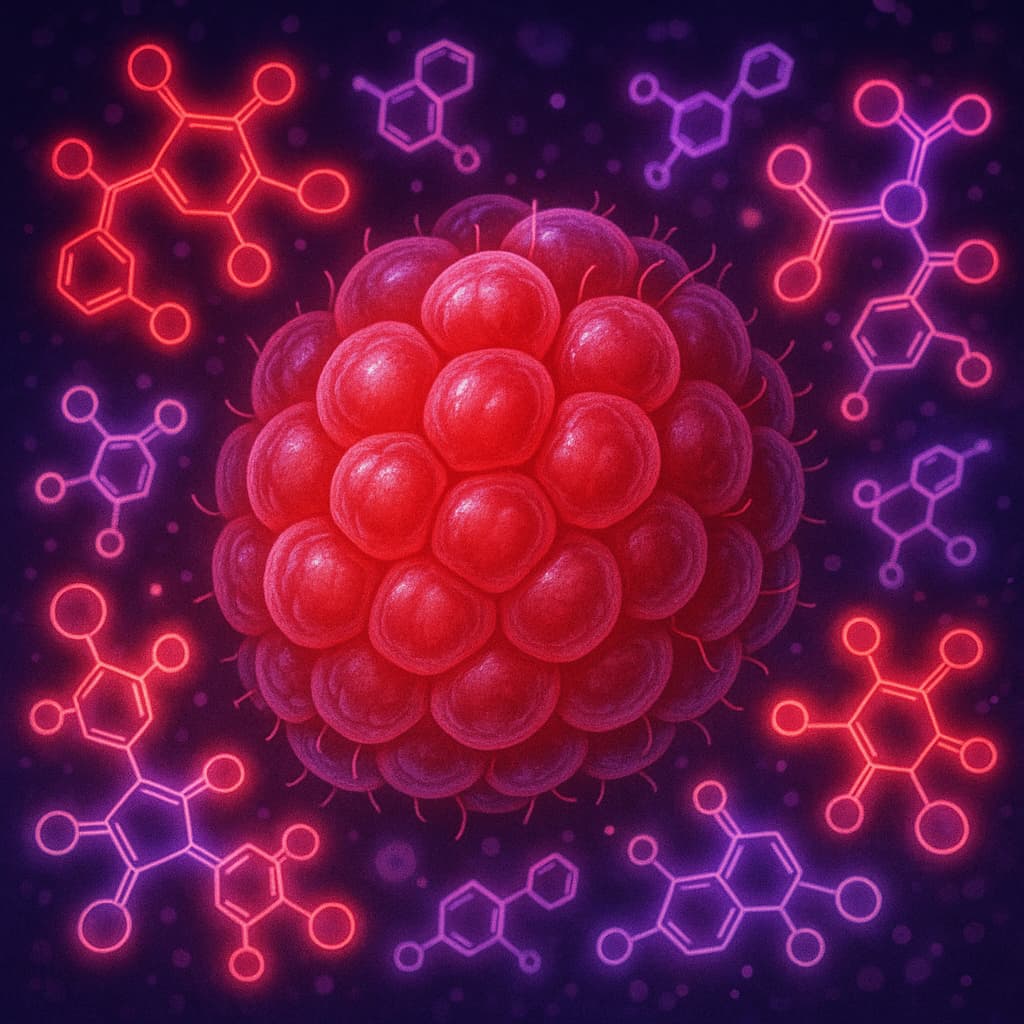
Raspberries are rich in polyphenols—notably anthocyanins, ellagitannins, and quercetin—which neutralize harmful free radicals that accelerate aging and disease. According to a study published in the Journal of Agricultural and Food Chemistry, red raspberry extracts significantly reduced oxidative DNA damage and inflammatory markers in vitro, suggesting powerful protective effects against cellular stress (PubMed, 2011).
Key antioxidant compounds include:
- Anthocyanins: Protect cells from oxidative stress and support vascular function.
- Ellagic acid: Promotes liver detoxification and DNA repair.
- Quercetin: Helps lower inflammation and may improve allergy resistance.
A review on Healthline highlights that these antioxidants may reduce the risk of chronic conditions such as heart disease, cancer, and neurodegeneration.
2. Supports Heart and Vascular Health

The combination of fiber, potassium and berry polyphenols in raspberries is especially beneficial for cardiovascular and vascular health. Studies show that frequent consumption of berries can strengthen blood vessels, improve circulation, and help balance cholesterol levels. A 2023 review in Frontiers in Nutrition found that berry polyphenols significantly improved endothelial (blood vessel) function and reduced LDL (“bad”) cholesterol oxidation — two major predictors of heart disease. (Frontiers in Nutrition, 2023)
How raspberries support your heart:
- Reduce LDL oxidation and arterial plaque formation.
- Improve arterial elasticity and blood vessel responsiveness for better circulation.
- Provide potassium and antioxidants that aid natural blood-pressure regulation.
According to Harvard Health Publishing – Heart-Healthy Foods: What to Eat and What to Avoid, diets rich in fruits, especially berries, are strongly associated with lower risk of cardiovascular disease because their antioxidants help protect arterial walls and improve vascular function.
3. May Help Manage Blood Sugar Levels
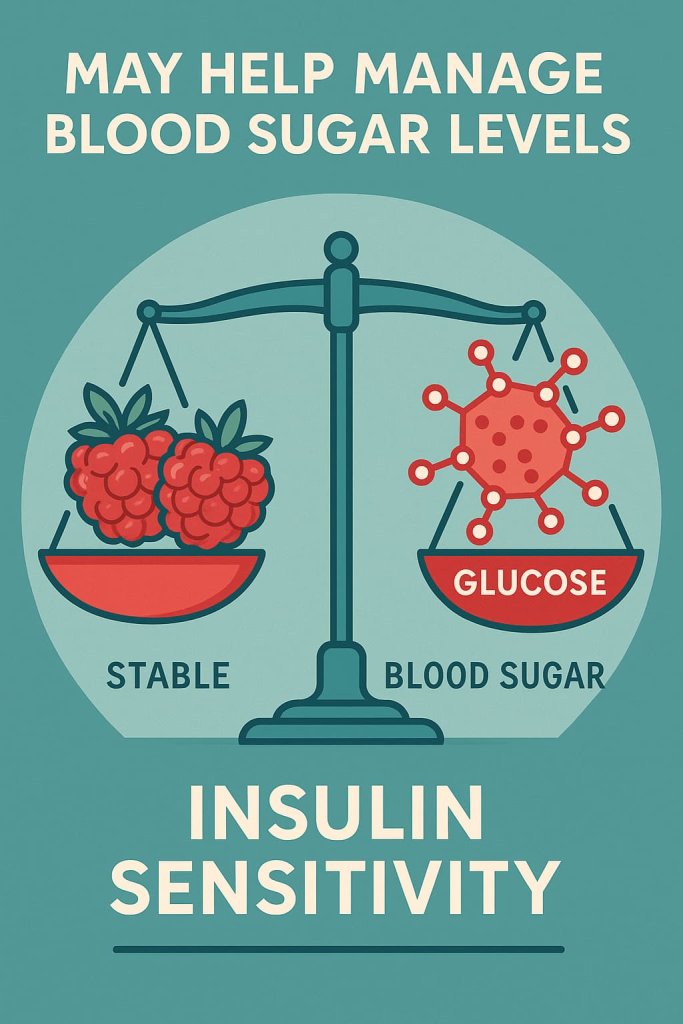
Despite their natural sweetness, raspberries have a low glycemic index (GI) and contain bioactive compounds that enhance insulin sensitivity. A controlled trial in Obesity (2019) found that participants with prediabetes who consumed 125 g of raspberries with a high-carb meal had lower post-meal glucose and insulin levels compared to controls (PubMed, 2019).
Why this matters:
- The fiber in raspberries slows down carbohydrate absorption.
- Polyphenols improve insulin signaling, helping cells use glucose efficiently.
- Raspberries are an ideal fruit choice for diabetics or those managing blood sugar.
The Diabetes UK foundation supports berries like raspberries as suitable fruits for people with type 2 diabetes due to their fiber and low sugar content.
4. Promotes Digestive and Gut Health

With about 8 grams of fiber per cup, raspberries are among the highest‐fiber fruits available. That fiber supports not just bowel regularity, but also the growth of beneficial gut bacteria that bolster digestive and immune health.
According to Harvard Health Publishing’s “Feed Your Gut” article (Harvard T.H. Chan School of Public Health), high‐fiber foods act as prebiotics—they feed the gut microbes like Bifidobacteria and Lactobacillus and help maintain a healthy intestinal barrier and digestive ecosystem.
Digestive benefits include:
- Promoting regular bowel movements and reducing constipation.
- Reducing bloating by improving digestive efficiency.
- Supporting a balanced and resilient gut microbiome, which in turn strengthens immunity and overall health.
5. May Aid Weight Management

Raspberries are low in calories yet high in fiber, helping you stay full longer and avoid overeating. Each cup contains only about 64 calories but provides 32% of your daily fiber needs.
Animal studies suggest that raspberry ketones and polyphenols may promote fat metabolism by increasing adiponectin, a hormone that helps regulate fat burning (NCBI, 2020). However, human evidence remains limited.
Practical tips for weight management:
- Replace sugary snacks with fresh raspberries.
- Combine with protein-rich foods like Greek yogurt or cottage cheese.
- Aim for ½–1 cup daily for best results.
6. Supports Skin and Anti-Aging

Raspberries are rich in vitamin C and antioxidants that promote skin regeneration and collagen synthesis. These nutrients protect against UV-induced oxidative stress, preventing wrinkles and maintaining elasticity.
According to Healthline, vitamin C in raspberries supports collagen production, while anthocyanins and ellagic acid reduce skin inflammation and pigmentation.
How raspberries support skin health:
- Enhance collagen formation for firmer skin.
- Neutralize free radicals that cause premature aging.
- Promote brighter, hydrated, and even-toned skin.
For maximum benefit, enjoy them fresh or blend into antioxidant smoothies.
7. Boosts Brain and Cognitive Function

Raspberries are rich in anthocyanins and flavonoids—bioactive compounds that can cross the blood-brain barrier and protect brain cells from oxidative stress. These antioxidants help improve neural communication, preserve memory, and may slow age-related cognitive decline.
A study published in the Annals of Neurology found that adults who regularly consumed berries rich in flavonoids, such as raspberries and blueberries, experienced slower rates of cognitive decline by up to 2.5 years compared to those who ate berries less frequently (Harvard Health Publishing, 2024). This research highlights how the antioxidants in raspberries can reduce inflammation in brain tissue and enhance overall mental performance.
Key brain benefits of raspberries:
- Enhance memory and learning: Flavonoids improve neuronal signaling and cognitive processing.
- Protect against oxidative stress: Antioxidants reduce free radical damage in brain cells.
- Support long-term brain health: Regular consumption may help delay cognitive aging and reduce risk of dementia.
The Harvard T.H. Chan School of Public Health also notes that berries are central to the MIND Diet, which combines elements of the Mediterranean and DASH diets to support optimal brain and heart function. Including a handful of raspberries several times per week can contribute to sharper thinking and long-term cognitive wellness.
8. May Reduce Risk of Certain Cancers
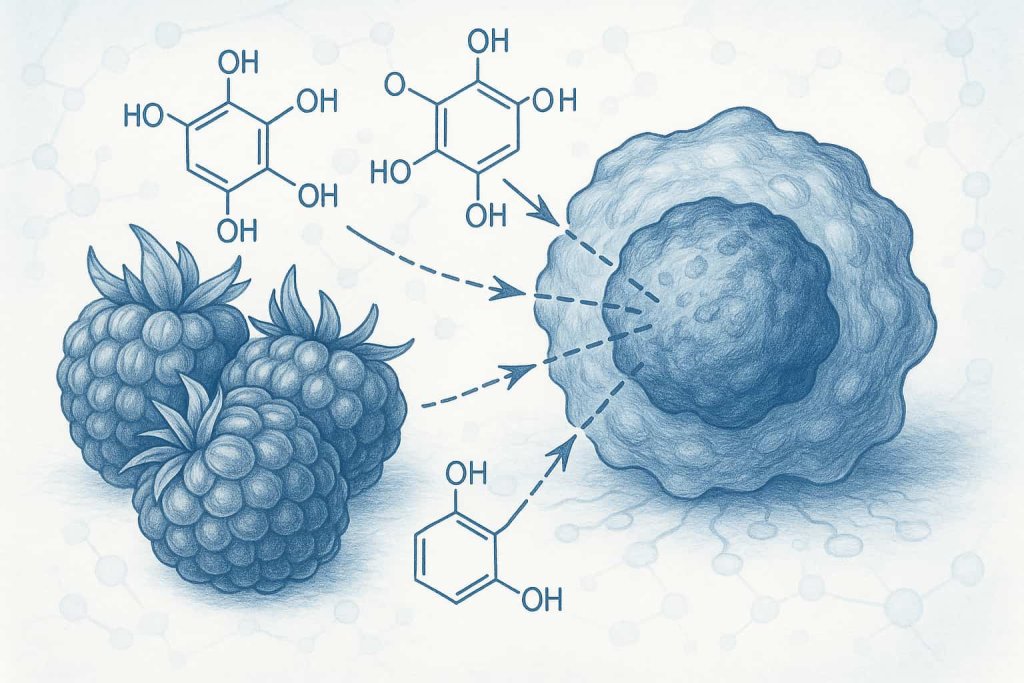
Raspberries contain ellagic acid and ellagitannins, compounds that have demonstrated anti-cancer properties in lab studies by inducing apoptosis (cell death) in cancer cells.
According to the American Institute for Cancer Research (AICR), these phytochemicals may help inhibit cancer cell growth and reduce oxidative DNA damage, especially in colon and breast tissues.
How raspberries may protect:
- Neutralize carcinogenic compounds.
- Support DNA repair mechanisms.
- Reduce inflammation that promotes cancer development.
While more human studies are needed, including raspberries as part of a plant-based, high-fiber diet can contribute to overall cancer prevention.
9. Strengthens the Immune System
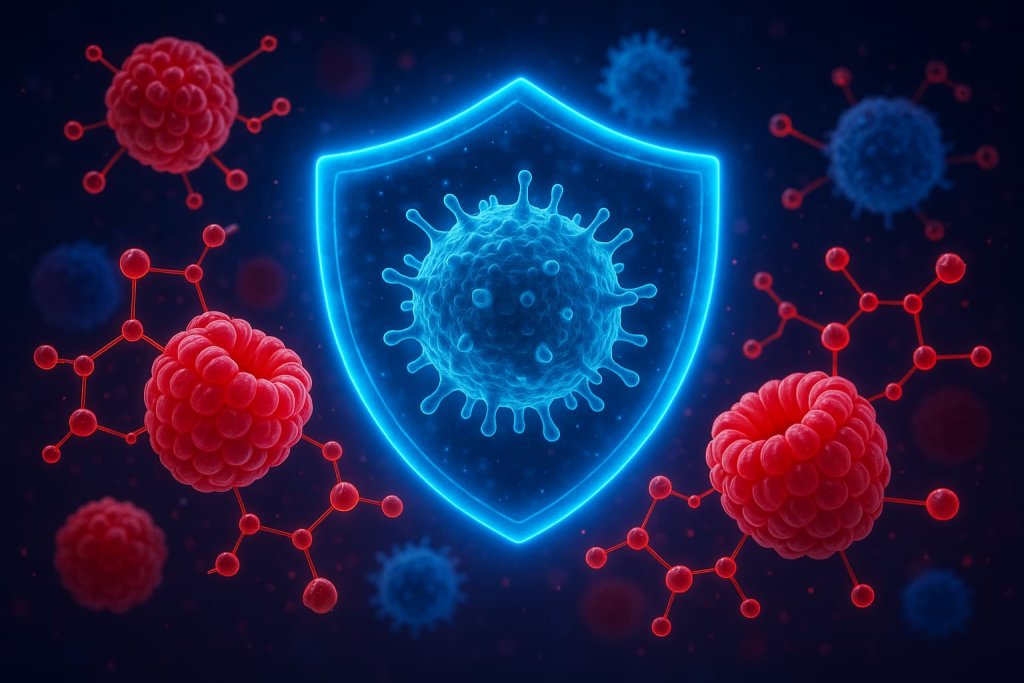
Raspberries are loaded with vitamin C, manganese, and quercetin, which collectively strengthen immune defense. Vitamin C enhances white blood cell production, while antioxidants reduce inflammation and oxidative stress on immune cells.
The Northwest Berry Cooperative reports that just one cup of raspberries provides over 30% of your daily vitamin C, helping your body resist infections and recover faster.
Best immune-boosting tips:
- Eat fresh or frozen raspberries (without added sugar).
- Pair with citrus fruits or kiwi for extra vitamin C.
- Include regularly in smoothies or breakfast bowls.
10. Supports Healthy Pregnancy and Women’s Health

Raspberries are an excellent source of folate, vitamin C, and manganese, which are essential during pregnancy. Folate helps prevent neural tube defects in developing babies, while antioxidants reduce maternal oxidative stress.
According to the National Institutes of Health (NIH), adequate folate intake is crucial during early pregnancy, and natural sources like raspberries are among the safest ways to get it.
Benefits for women’s health:
- Support healthy fetal development.
- Aid in hormone balance and menstrual regularity.
- Provide antioxidants that protect reproductive tissues.
Note: Raspberry leaf tea or supplements should only be used under medical supervision, especially during pregnancy, as effects on uterine contractions may vary.
Nutritional Profile of Raspberries
Raspberries are one of nature’s most nutrient-packed fruits, offering a remarkable combination of fiber, vitamins, minerals, and antioxidant compounds—all for fewer than 70 calories per cup. Their balanced nutrient density makes them a functional superfood that supports heart, gut, and metabolic health.
Below is the detailed nutritional profile for 1 cup (123 g) of raw red raspberries, based on USDA FoodData Central (2024).
| Nutrient | Amount per 1 cup (123 g) | % Daily Value (DV) | Health Function |
|---|---|---|---|
| Calories | 64 kcal | — | Low-calorie energy source |
| Total Carbohydrates | 14.7 g | 5% | Provides slow-releasing energy |
| Dietary Fiber | 8 g | 32% | Promotes gut health and satiety |
| Protein | 1.5 g | 3% | Supports tissue repair |
| Fat | 0.8 g | 1% | Naturally low-fat |
| Vitamin C | 32 mg | 36% | Boosts immunity, collagen, and antioxidant defense |
| Vitamin K | 9.6 mcg | 8% | Supports blood clotting and bone strength |
| Folate (Vitamin B9) | 25 mcg | 6% | Essential for DNA synthesis and pregnancy health |
| Manganese | 0.8 mg | 41% | Aids metabolism and antioxidant enzyme function |
| Magnesium | 27 mg | 6% | Supports muscle and nerve function |
| Potassium | 186 mg | 4% | Helps regulate blood pressure |
| Antioxidants | — | — | Anthocyanins, ellagic acid, quercetin, catechins |
These nutrients, particularly fiber, vitamin C, and anthocyanins, are responsible for most of raspberries’ proven health benefits. The high fiber content supports digestive and cardiovascular health, while antioxidant compounds combat oxidative stress that contributes to chronic diseases.
(Sources: USDA FoodData Central, 2024)
How to Eat Raspberries for Best Results
Raspberries are easy to include in your daily routine, but to get the most health benefits, it helps to know when and how to eat them safely and effectively.
Recommended serving size:
½ to 1 cup (60–120 grams) per day is ideal for most adults. This provides enough fiber and antioxidants without excessive natural sugar intake.
Best timing:
- Morning: Eat fresh raspberries with breakfast for sustained energy.
- Pre-workout: The natural carbs provide light energy while fiber prevents blood sugar spikes.
Best pairings:
- Mix with yogurt, oats, chia pudding, or smoothies.
- Combine with nuts or seeds for balanced fats and protein.
- Use as a natural topping for salads, pancakes, or cottage cheese.
Organic vs. conventional:
Raspberries are on the Environmental Working Group’s “Dirty Dozen” list due to pesticide residues. When possible, choose organic or wash thoroughly under running water before eating. (EWG, 2024)
Storage and freshness tips:
- Store unwashed raspberries in the refrigerator for up to 3 days.
- Wash just before eating to prevent mold.
- Freeze on a tray before storing in bags for long-term use (up to 12 months).
(Sources: Healthline, 2024; USDA, 2024)
Possible Side Effects and Precautions
Raspberries are generally safe and healthy, but as with any food, moderation and awareness are key—especially for people with certain conditions.
1. Allergic reactions:
Rare, but possible. Symptoms may include itching, swelling, or rash. Discontinue use and consult a healthcare provider if these occur.
2. Oxalate content:
Raspberries contain moderate levels of oxalates, natural compounds found in many plant-based foods. In most people, oxalates pose no problem; however, in individuals prone to kidney stones, excessive oxalate intake can contribute to the formation of calcium oxalate stones—the most common type of kidney stone.
According to the Cleveland Clinic (2024), people with a history of kidney stones should limit high-oxalate foods and stay well hydrated to reduce stone risk. The Clinic advises pairing oxalate-containing foods with calcium-rich foods (like yogurt or milk), which helps bind oxalate in the gut and prevents its absorption into the bloodstream.
Evidence-based safety tips:
- Hydrate consistently: Drink at least 8–10 glasses (2–3 liters) of water daily to dilute urinary minerals.
- Pair with calcium sources: Combining raspberries with dairy or fortified plant milk can help neutralize oxalate absorption.
- Practice moderation: A serving of ½–1 cup of raspberries a few times a week is generally safe for most adults.
- Consult your doctor: If you’ve had calcium oxalate stones, seek medical advice before increasing raspberry or other high-oxalate fruit intake.
A balanced diet—including a variety of fruits, vegetables, and adequate fluids—is the best long-term approach to kidney stone prevention and overall urinary health.
(Source: Cleveland Clinic – How to Prevent Kidney Stones)
3. Sugar in processed products:
Avoid raspberry jams, syrups, and sweetened yogurts—they often contain added sugars that negate health benefits.
4. Raspberry ketone supplements:
While marketed for weight loss, evidence is limited and unregulated. These supplements may interfere with blood pressure or diabetes medications. Always consult your doctor before use. (NIH Office of Dietary Supplements, 2024)
5. Pregnancy safety:
Whole raspberries are safe in normal dietary amounts, but raspberry leaf tea or extracts should be used cautiously, especially in early pregnancy, due to potential uterine effects. Always check with your obstetrician.
Disclaimer:
This information is for educational purposes and should not replace medical advice. Always seek guidance from a qualified healthcare provider before making dietary changes.
Frequently Asked Questions (FAQ)
1. Are raspberries safe for diabetics?
Yes. Their low glycemic index and high fiber content help stabilize blood sugar levels, making them suitable for most diabetics.
(Source: Diabetes UK)
2. How many raspberries should I eat daily?
½–1 cup daily is sufficient to gain benefits without excessive sugar intake.
3. Can I eat frozen raspberries?
Yes. Frozen raspberries retain nearly all their nutrients and antioxidants. Just choose unsweetened varieties.
4. Do raspberries help skin glow?
Yes. Vitamin C and antioxidants help boost collagen and protect skin cells from UV damage, promoting a natural glow.
5. Are raspberry ketone supplements safe?
Not recommended without medical supervision. Evidence for weight loss benefits is weak, and supplements may interact with medications.
6. Are raspberries safe for kids and pregnant women?
Yes, when eaten as whole fruit in moderation. They provide vital nutrients like vitamin C and folate that support growth and pregnancy health.
7. Can raspberries cause stomach issues?
Overconsumption may cause mild bloating or gas due to high fiber content. Increase intake gradually and drink plenty of water.
Conclusion
Raspberries are a small fruit with big health potential. Rich in fiber, antioxidants, and essential vitamins, they can help protect your heart, balance blood sugar, and support skin, gut, and immune health.
Adding just a handful of raspberries to your daily diet—in smoothies, yogurt, or fresh snacks—can make a meaningful difference in your long-term wellness.
Always remember: whole raspberries are safe and beneficial, but processed or supplemental forms should be approached cautiously. For personalized guidance, consult a registered dietitian or healthcare provider.
References
- USDA FoodData Central – Raspberries, Raw (2024)
Comprehensive nutritional data source for calories, vitamins, minerals, and fiber values of fresh raspberries. - Jean-Gilles D, Li L, Ma H, Yuan T, Chichester CO, Seeram NP. (2011). Anti-inflammatory effects of polyphenolic-enriched red raspberry extract. Food Chemistry, 126(2), 721–726.
Peer-reviewed study showing raspberry polyphenols reduce oxidative stress and inflammation. - Xiao D, et al. (2019). Red raspberries attenuate post-meal glucose and insulin responses in adults with prediabetes. Obesity, 27(8), 1335–1343.
Clinical trial demonstrating improved postprandial glucose control from raspberry consumption. - Harvard T.H. Chan School of Public Health – The Nutrition Source: Berries
Authoritative overview on how berries, including raspberries, support cardiovascular, metabolic, and brain health. - American Institute for Cancer Research (AICR) – Raspberries: Foods That Fight Cancer
Explains the anti-cancer and antioxidant properties of raspberry compounds such as ellagic acid and fiber.
